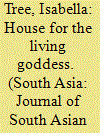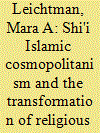| Srl | Item |
| 1 |
ID:
132287


|
|
|
|
|
| Publication |
2014.
|
| Summary/Abstract |
In 2007, during the course of planning the 250th anniversary celebrations of the inauguration of the Kumari Chen-the house of the 'Living Goddess' in Kathmandu's Durbar Square-a new document came to light, which recorded significant alterations made to the building only four years after its foundation. This paper shows how these changes affected the Kumari Chen's identity, transforming it from a building originally designed for royal Hindu Tantric worship to a building with dual purpose, where separate Hindu and Buddhist Tantric worship could take place under the same roof. Taking into account the historical context in which the Kumari Chen was established, this paper explores the purpose for which the building was created by the last Malla king of Kathmandu and identifies motives for the subsequent alterations, shedding light on the relationship between Newar Buddhists and their Hindu king in a time of unprecedented crisis.
|
|
|
|
|
|
|
|
|
|
|
|
|
|
|
|
| 2 |
ID:
131913


|
|
|
|
|
| Publication |
2014.
|
| Summary/Abstract |
Standard historical accounts of the Indian Revolt of 1857-58 give the impression that superiority on the battlefield accounted for the ability of the British to defeat their Indian adversaries. Yet, to focus solely on the military campaigns ignores the intricate and multifaceted nature of the British response to the Revolt. Aside from armed force, a number of counter-insurgency strategies were used to suppress rebellion in the countryside. This paper assesses the intent and effectiveness of these measures by looking at how officials responded to the outbreak of large-scale and protracted rural insurgency in the districts of the Benares Division. It is argued that these measures achieved a far greater degree of success in curtailing acts of rural insurgency than the use of military force.
|
|
|
|
|
|
|
|
|
|
|
|
|
|
|
|
| 3 |
ID:
134222


|
|
|
|
|
| Publication |
2014.
|
| Summary/Abstract |
Senegalese "conversion" to Shi'i Islam resulted from cosmopolitan interactions with West Africa's resident Lebanese population and Iranian revolutionary ideologies. Shi'i advocates spread their religious convictions through teaching, conferences, holiday celebrations, and media publicity. Key to their success are libraries full of Arabic and French texts from Iran and Lebanon. Inherent in Islamic education is the authority bestowed on those who are knowledgeable, and with the spread of religious knowledge through books, media, and the Internet comes a broadening of the scope of religious authority and resulting conflict with or accommodation of old political communities. Senegalese converts to Shi'i Islam use their literacy in Arabic and individually acquired libraries of Islamic legal books to bypass the authority of Sufi marabouts. Some keep their feet in both Sunni and Shi'i worlds, and their ability to compare religious texts of both traditions wins them disciples. Shi'i minorities claim autochthony and authenticity in Senegal through narrating revisionist historical accounts of the spread of (Shi'i) Islam to Africa. Conferences commemorating the martyrdom of Imam Husayn during the Shi'i mourning period in the month of Muharram target Sufi Muslims who also love the family of the Prophet. Shi'i leaders skillfully detach this foreign religious ideology from Middle Eastern politics and make this branch of Islam relevant to Senegalese through establishing religious centers as NGOs, which work to bring health care and economic development to neighborhoods in the name of Shi'i Islam.
|
|
|
|
|
|
|
|
|
|
|
|
|
|
|
|